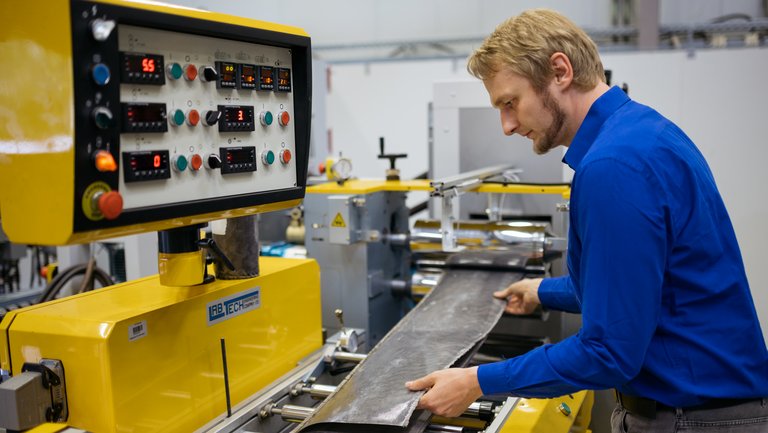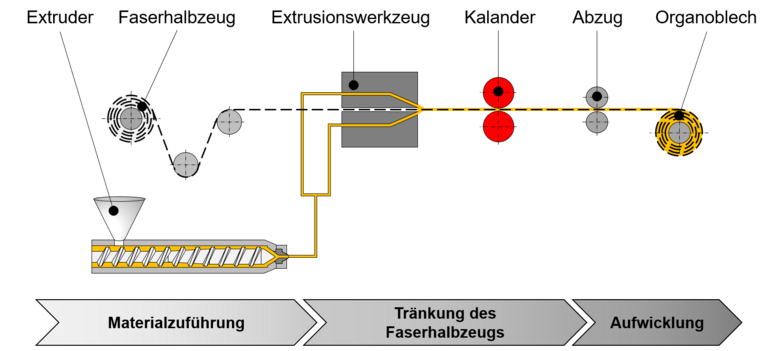As part of the "VerDiOr" joint project funded by the Federal Ministry for Economic Affairs and Energy, the Plastics Technology Group at Ilmenau University of Technology is working together with Folienwerk Wolfen GmbH on an innovative manufacturing process for the energy-efficient production of organic sheets.

Organic sheets are continuous fiber-reinforced thermoplastics and are used in particular in automotive and aircraft construction. However, their production is currently associated with high energy consumption and thus considerable production costs. The project aims to change this and thus increase the energy efficiency of electric vehicles, among other things.
The sustainable use of resources and the efficient use of energy are central tasks in the 21st century and require a transformation of established processes towards new technologies. The field of mobility in particular is facing major challenges as a result of the change to electromobility, as the energy consumption of electric vehicles is increased by the heavy accumulators. By adapting conventional metals to novel hybrid materials, vehicle weight can be reduced and energy efficiency increased.
High energy consumption of conventional manufacturing processes
Continuous fiber-reinforced thermoplastics - also known as organic sheets - combine the good formability of thermoplastics with the exceptional mechanical properties of reinforcing fibers and are predestined for the substitution of metal sheets due to their high lightweight construction potential. The fiber-reinforced plastics can be recycled at the end of their useful life and reprocessed in line with the circular economy. By back-injecting the recycled material into the organic sheets using the injection molding process, functionalized structural components such as battery boxes or door modules can be produced with low weight.
According to the current state of the art, the first step in the production of organic sheets from plastic granulate is to produce films, powders or plastic fibers. Only in a subsequent processing step is the plastic re-melted and further processed with the fibre semi-finished product to form an organic sheet. Due to the multiple melting and cooling of the plastic, however, these conventional manufacturing processes are associated with high energy and manufacturing costs.
Production of organic sheets in one manufacturing step
The Plastics Technology Group at the Technical University of Ilmenau is working on the development of an energy-saving production process for organic sheets in order to reduce energy consumption and the associated production costs. Together with the cooperation partner Folienwerk Wolfen GmbH, a laboratory plant designed at the Department of Plastics Technology is being further developed in the joint project "VerDiOr" and a prototype is being implemented on a production scale, which should enable the energy-efficient production of organic sheets with a width of up to one meter. In contrast to conventional manufacturing processes, the plastic granulate can be further processed into an organic sheet in one manufacturing step in this direct extrusion process, which saves a melting process of the plastic and significantly reduces energy consumption.

In addition to an extruder, an extrusion die and a calender, the production chain of the direct extrusion line of the Plastics Technology Group also consists of machine technology for unwinding the fiber semi-finished product and for winding the organic sheet. In the extruder, the plastic granulate is melted and then continuously applied to both sides of the semi-finished fibre product via the extrusion tool. The semi-finished fiber is then impregnated with the plastic melt and the surface of the organic sheet is smoothed between two temperature-controlled calender rolls.
High flexibility in material selection
Another advantage of direct extrusion of organic sheets is the high flexibility in material selection. In addition to various conventional and bio-based plastics, different types of fibers such as glass, carbon or natural fibers can also be processed. By selecting suitable material combinations, the organic sheets can thus be adapted to the corresponding load cases in accordance with the requirements.
The project is funded by the German Federal Ministry for Economic Affairs and Energy as part of the "Central Innovation Program for SMEs" (ZIM) under the funding code KK5007902EB0. The management is carried out by the Thuringian Innovation Center Mobility (ThIMo).

